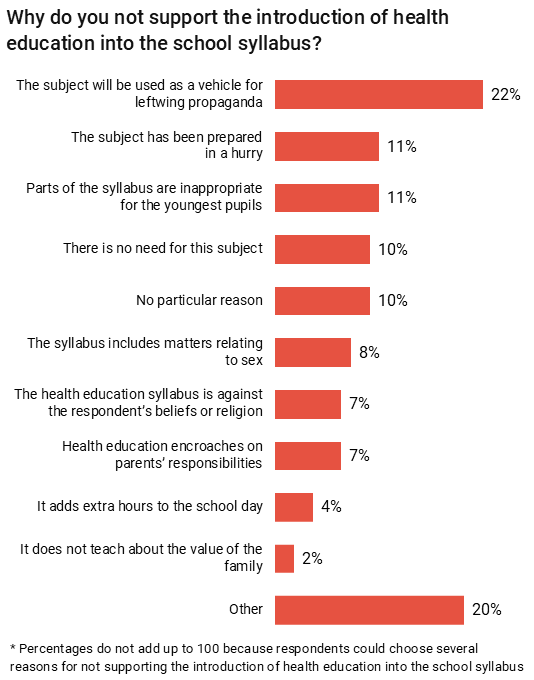26/2025
2025-11-19
A New School Subject
Of the people who have heard of health education, 60% support the introduction of this new subject into schools, with the majority (37%) being strongly in favour. On the other hand, 31% of the people surveyed are against the new subject, with 9% having no clear view.
Respondents who did not want health education brought into schools were most often worried that the subject would be used to propagate leftwing ideology (22%). Another frequently expressed worry (11%) was that the subject had been prepared in a hurry, there were no textbooks yet and teachers had not been trained to teach it, which meant that there was no clarity over what exactly would be taught. Another group of similar size (11%) thought that the health education syllabus was not appropriate for the youngest pupils and should be introduced at a later stage. A group of 10% thought the subject was unnecessary (for example because its content was already included in other subjects) and another 10% did not give any reasons for their opposition to children being taught health education. Less common reasons for not wanting this subject included the presence of matters relating to sex in its syllabus (8%), that it was against the respondent’s beliefs or religion (7%), that it was the parents’ responsibility to inform their children on the topics contained in the health education syllabus (7%), that it added extra hours onto the school day (4%) and that the syllabus did not include topics related to the value of the family (2%).

|
More on this subject in the CBOS report.
This ‘Current Events and Problems’ survey (426) was conducted using a mixed-mode procedure on a representative sample of named adult residents of Poland, randomly selected from the National Identity Number (PESEL) register. Respondents independently selected one of the following methods: Computer Assisted Personal Interview (CAPI); Computer Assisted Telephone Interview (CATI), respondents receiving researchers’ telephone numbers in an introductory letter from CBOS; Computer Assisted Web Interview (CAWI), where respondents filled in the online questionnaire independently, gaining access by means of a login and password provided in an introductory letter from CBOS. In all three cases the questionnaire had the same structure and comprised the same questions. The survey was carried out between 2 – 13 October 2025 inclusive on a sample of 901 people (61.2% using the CAPI method, 22.5% CATI and 16.3% CAWI). CBOS has been conducting statutory research using the above procedure since May 2020, stating in each case the percentage of personal, telephone and internet interviews.





